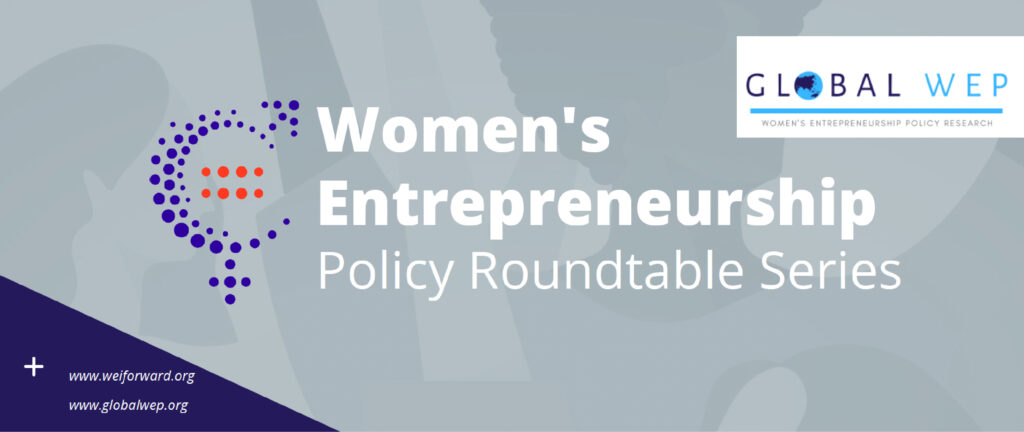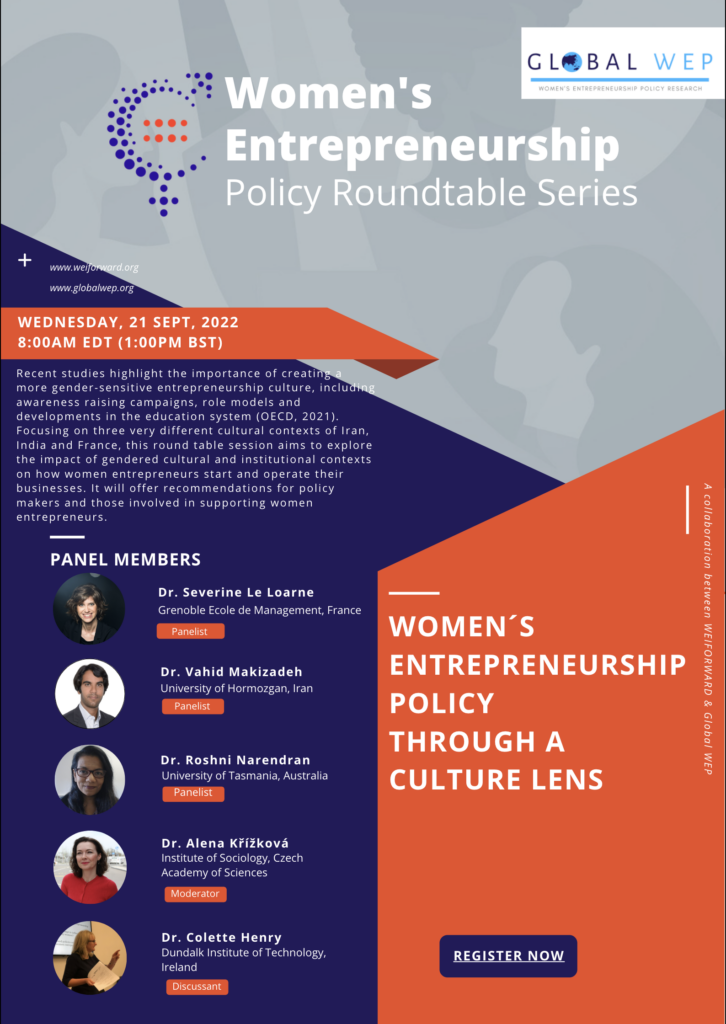WEI Global Institute Entrepreneurship Policy Roundtables Women’s Entrepreneurship Policy Through a Culture Lens 21 September, 2022.
Wednesday 21st September 2022
Recent studies highlight the importance of creating a more gender-sensitive entrepreneurship culture, including awareness raising campaigns, role models and developments in the education system (OECD 2021). Focusing on three very different cultural contexts of Iran, India and France, this round table session aimed to explore the impact of gendered cultural and institutional contexts on how women entrepreneurs start and operate their businesses. It also offered some recommendations for policy makers and those involved in supporting women entrepreneurs.
Panel Members
Dr. Severine Le Loarne, Grenoble Ecole de Management, France (Panelist)
Dr. Vahid Makizadeh, University of Hormozgan, Iran (Panelist)
Dr. Roshni Narendran, University of Tasmania, Australia (Panelist)
Dr. Alena Krizkova, Institute of Sociology, Czech Academy of Sciences (Moderator) Dr. Colette Henry, Dundalk Institute of Technology, Ireland (Discussant)
Summary
Dr. Krizkova moderated today ́s panel, covering cultural barriers for women entrepreneurship, probing for the existence of policies that have had a positive impact on the cultural context for women entrepreneurs, and encouraging panelists to provide their recommendations for promoting gender-sensitive entrepreneurship culture.
In France, women represent less than 30% of entrepreneurs, a figure that has changed little since the 70s. Many women create very small ventures, mainly to gain income and in the face of unemployment. They generally operate in traditional sectors and do not operate in trending sectors such as AI and green ventures. Despite the institutional pressure to promote women entrepreneurship, the prevailing culture also expects them
to be good mothers and raise children. Although modern families may share childcare responsibilities, traditional families and some religions impose more traditional constraints on women. Overall, it is very difficult for women to achieve a degree of life-work balance.
Dr. Le Loarne highlighted a number of current shortcomings. First, the plethora of frequently overlapping initiatives and networks targeting women entrepreneurs create a complex and opaque ecosystem. Second, the emphasis on the organization of round tables has had limited impact on the entrepreneurial activity of women, with access to successful role models proven to be much more important. There is a need for a re-think about how to allocate the available budget for greater impact. Furthermore, after 20 years of promoting women ́s entrepreneurship, the policy focus is evolving towards addressing issues such as violence against women. Although clearly necessary, it is important not to divert resources currently focused on entrepreneurship so that policies can remain consistent and be supported by appropriate actions.
India has come a long way in implementing programmes to reduce gender inequalities, but not all have been eliminated. Women may find themselves unable to engage in specific practices, such as drinking and socializing with clients, thereby making it more difficult to grow their networks. They may be obliged to take a male business partner or employee on business trips. These kinds of constraints can result in lost opportunities and slow business growth. Drawing on the example of transgender women, Dr. Narendran emphasized the importance of combining programmes with support, and advocated for the incorporation of all types of barriers into policy making, rather than simply focusing on entrepreneurship development, which is insufficient if it does not address the cultural context of women ́s entrepreneurship.
In Iran the context is characterized by the Muslim religion, a relatively conservative government, and a society which is more modern and moving towards the breaking of traditions. Despite a traditional emphasis on women’s roles as homemaker and caregiver that renders women’s entrepreneurship unnecessary, it is important to understand that Iran represents a melting pot of ethnicities, religions and cultures, with a variety of views and values. This is leading to a change both for women in general and their business activities in particular. Policies are largely silent on gender and entrepreneurship policies focused on women are limited in scope. Women ́s entrepreneurship is largely defined as home-based business, and programmes focus on training and mentoring, but without regard to the heterogeneity of women entrepreneurs, their businesses and their needs. In the light of the above, panelists were asked for their recommendations to promote a gender-sensitive entrepreneurship culture.
Responding to the call for recommendations, Dr. Le Loane stressed the need for a more contextualized approach to women entrepreneurship, addressing the needs of different
segments and incorporating the voices of all segments of women in the policy process, including the more marginalized or hard to reach. She also highlighted the potential marginalization of women when support is provided in the “new industries”, unless a concerted effort is made to help women get into these sectors first.
Dr. Narendran pointed to the importance of gathering disaggregated data. By way of example, she highlighted the need for data about single women and single mothers in order to ensure that this currently hidden group can access appropriate support.
Dr. Makizadeh pointed to the remaining legal restrictions for women in Iran that need to be tackled, including greater freedom to travel for women. He also highlighted the need for more systematic action to support women entrepreneurs in Iran, through associations and other organizations. These are currently scattered, do not engage in common activity, so there is no critical mass and little mutual support.
In her closing remarks, Dr. Henry noted the similarities and differences from the three different countries, reiterating the importance of understanding the cultural context. Change is a slow and complex process, but this is not an excuse to abandon the challenge. Rather, it should spur policymakers on to involve women at all stages of the policy process, to be mindful of the cultural context, to evaluate existing policies carefully in order to understand where and how they can make a difference, and to learn from mistakes.
The WEI Global Institute (WGI) collaborates with partners, such as the Global Women’s Entrepreneurship Policy Research Network (Global WEP), to engage academics, policy makers, private sector, and key stakeholders. The virtual roundtables aim to identify and address issues & solutions, share lessons, and advocate for changes necessary to advance gender economic equity.
Our inaugural 2022 series is co-sponsored by the WGI and the Global WEP.
Join us on September 21 for the second in a series of three roundtables on Women’s Entrepreneurship Policy Through a Culture Lens. To join us, register here: bit.ly/3RAiqph
Wednesday, 21 September 2022 8:00am EDT (1:00 pm BST/2:00pm CET)
The myth of under-performance, negative attitudes towards women entrepreneurs, lower credibility and limited access to funding for women as well as disproportionate responsibilities for unpaid care-work represent important cultural barriers for women’s entrepreneurship (Jurik, 2020; Marlow & McAdam, 2013; OECD, 2021; Yousafzai, Fayolle, et al., 2018). Entrepreneurship policies and policies focused specifically on women’s entrepreneurship support are embedded in particular cultural contexts. Also ,employment policies, family and tax policies are gendered and embedded in the cultural context limiting or enhancing women’s entrepreneurship potential (Welter, 2011). It is important to analyze contexts in how they shape women’s entrepreneurial activities at transnational, national and regional level, and to recognize and dismantle culturally embedded barriers to entrepreneurship practice and to access to support policies and look for examples of how female entrepreneurs through their endeavors modify these contexts (Yousafzai, Lindgreen, Saeed, Henry, & Fayolle, 2018).
Recent studies highlight the importance of creating a more gender-sensitive entrepreneurship culture, including awareness raising campaigns, role models and developments in the education system (OECD, 2021). Focusing on three very different cultural contexts of Iran, India and France, this roundtable session aims to explore the impact of gendered cultural and institutional contexts on how women entrepreneurs start and operate their businesses. It will offer recommendations for policy makers and those involved in supporting women entrepreneurs.
Chair/Moderator
Alena Křížková, Institute of Sociology, Czech Academy of Sciences
Panel Members
Roshni Narendran, University of Tasmania, Australia
Vahid Makizadeh, University of Hormozgan, Iran
Severine Le Loarne, Grenoble Ecole de Management, France
Discussants
Colette Henry, Dundalk Institute of Technology, Ireland and Griffith University, Australia
Join us to engage in the discussion and to discuss positive solutions towards making entrepreneurial spaces gender-just.


